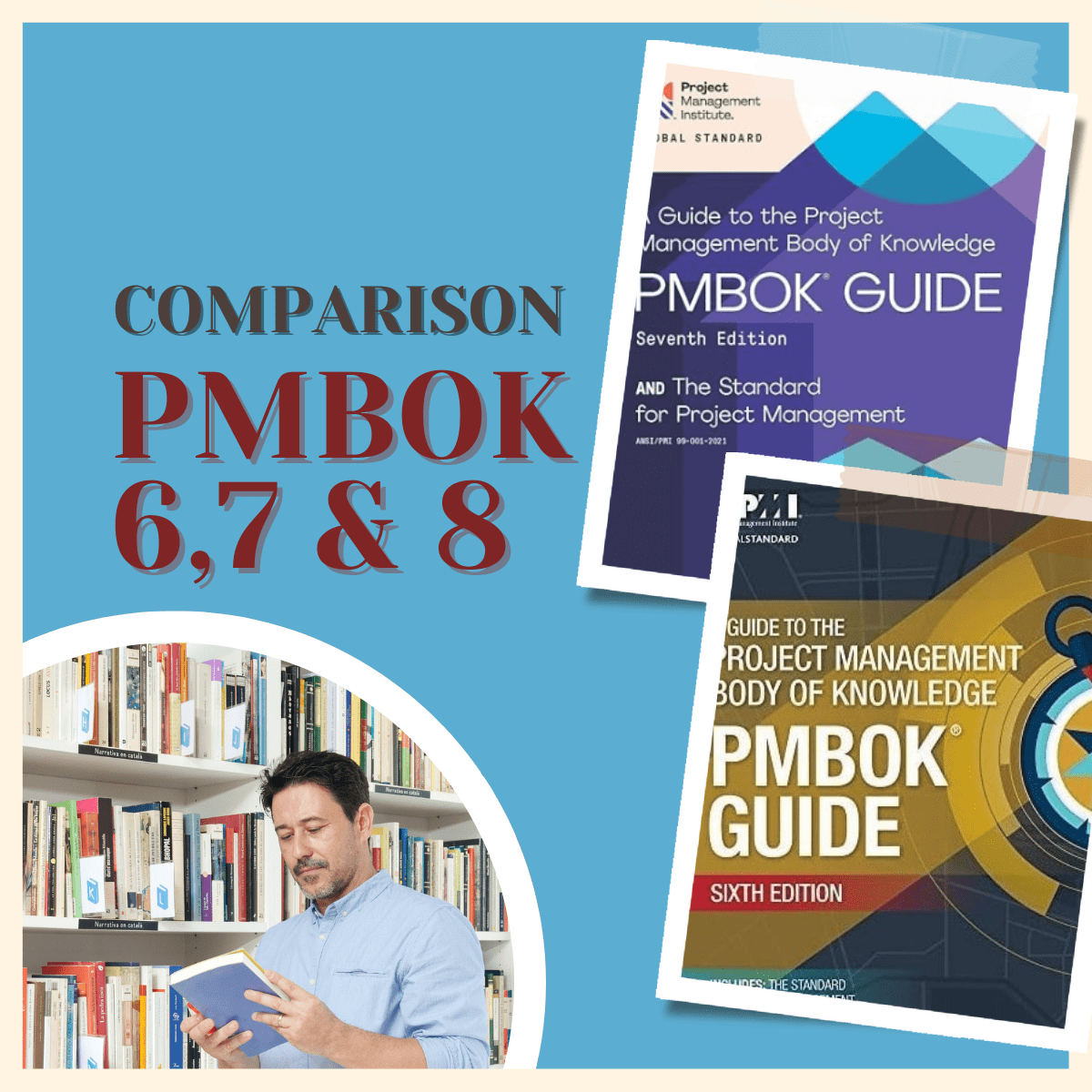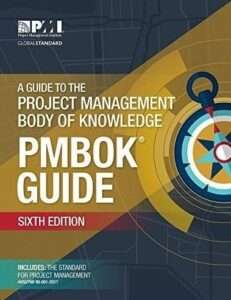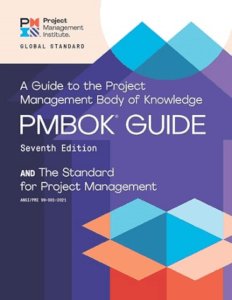
PMBOK Guide: A Detailed Comparison of the 6th, 7th, and 8th Edition that Top Differences You Need to Know
- Posted by Lislal Viswam
- Categories Project Management
- Date 20 January 2025
The PMBOK® Guide (Project Management Body of Knowledge) is a globally recognized standard for project management. The guide is periodically updated to reflect changes in the profession, new trends, and best practices. This blog is a brief comparison of PMBOK® 6th Edition, 7th Edition, and 8th Edition.
PMBOK® Guide – 6th Edition (2017)
Overview: The 6th Edition was process-oriented and followed a structured, traditional project management framework. It emphasized detailed processes for managing projects in a predictable, plan-driven manner. It is primarily for traditional, predictive (waterfall) project management methodologies, but also applicable to Agile in some contexts.

Key Features:
Process Groups:
- 5 Process Groups: Initiating, Planning, Executing, Monitoring & Controlling, and Closing.
- Detailed processes for each group, with a focus on specific tasks and deliverables.
Knowledge Areas:
- 10 Knowledge Areas: These include Scope Management, Schedule Management, Cost Management, Quality Management, Resource Management, Communications Management, Risk Management, Procurement Management and Integration Management
Processes:
- 49 processes across the 10 Knowledge Areas and 5 Process Groups.
- Extensive use of ITTOs for each process (Input, Tools & Techniques, Outputs).
Emphasis on Risk Management:
- Risk Management is deeply integrated, with a strong focus on identifying, assessing, and responding to risks throughout the project lifecycle.
Methodology:
- Aligned with Waterfall, predictive methodologies where planning is done upfront, and projects follow a sequential, structured path.
Tools & Techniques:
- Prescriptive tools and techniques for each process, such as work breakdown structure (WBS), Gantt charts, and Monte Carlo simulations.
PMBOK® Guide – 7th Edition (2021)
Overview: The 7th Edition shifts away from a process-based approach to a principles-based approach. It emphasizes delivering value over following prescribed steps. This edition acknowledges the growing adoption of Agile and Hybrid methodologies. It is designed for a broader audience of project managers working with Agile, Waterfall, or Hybrid methods, and in complex, fast-changing environments.

Key Features:
Principles-Based Approach:
- 12 Principles of project management are introduced (e.g., stakeholder engagement, team collaboration, value delivery).
- Provides high-level guidance rather than detailed, prescriptive steps.
Performance Domains:
- Replaces the 10 Knowledge Areas with 8 Performance Domains (e.g., stakeholder performance, team performance, life cycle performance).
- These domains are used to guide project managers in delivering value without prescribing specific steps or processes.
Flexibility in Methodology:
- The 7th edition embraces flexibility, acknowledging that different projects require different approaches (Waterfall, Agile, Hybrid).
- Encourages tailoring practices to suit the specific needs of each project.
Value Delivery:
- Focuses on delivering value through value streams and outcomes rather than focusing solely on outputs or deliverables.
System Thinking:
- Emphasizes the importance of systems thinking, understanding that projects are part of broader systems (organizational, environmental, societal).
Agile, Hybrid, and Predictive Approaches:
- While still including traditional methodologies, the 7th edition heavily embraces Agile and Hybrid project management approaches, with a focus on adaptability and flexibility.
Tools & Techniques:
- Tools and techniques are not prescribed but are to be chosen based on the needs of the project and its context.
PMBOK® Guide – 8th Edition (2025, Upcoming)
The PMBOK Guide 8th Edition (Project Management Body of Knowledge) is an upcoming release from the Project Management Institute (PMI), which is expected to introduce significant updates and changes.
Overview: The 8th Edition builds on the principles-based approach of the 7th edition and continues to adapt to the changing landscape of project management. There is an even greater emphasis on digital transformation, data-driven decision-making, and managing complexity in projects. The audience include Project managers involved in a range of project types, especially those in fast-paced, technology-driven, or high-complexity environments.
Key Features:
Evolution of Principles:
- The principles introduced in the 7th edition are expanded and refined.
- 14 Principles in total (e.g., adaptability, digital transformation, stakeholder alignment, sustainability).
Focus on Complexity:
- PMBOK 8 recognizes the increasing complexity of modern projects (e.g., driven by digital technologies, cross-functional teams, and global environments).
- Projects must be able to handle uncertainty and complex stakeholder landscapes.
Digital Transformation & Data:
- Digital tools are emphasized more, including the use of artificial intelligence (AI), machine learning (ML), and data analytics to manage projects.
- Data-driven decision-making becomes a core theme, highlighting the use of analytics to track performance, forecast risks, and optimize project delivery.
Integration with Other Frameworks:
Sustainability & Ethics:
- Strong emphasis on sustainability and ethical practices, ensuring that projects not only meet business goals but also align with broader social and environmental objectives.
Tools and Techniques:
- PMBOK 8 introduces more digital tools for collaboration, project tracking, and automation of tasks (e.g., project management software, automation tools for repetitive tasks).
- A focus on using agile tools and methodologies to support iterative and flexible project management.
Focus on Outcomes:
- The concept of outcomes over outputs is further reinforced, with a deeper focus on delivering real business value and aligning with the organization’s strategic goals.
Hybrid Projects:
- PMBOK 8 continues the trend of embracing hybrid methodologies, combining the best practices from Agile, Waterfall, and other approaches to suit the specific needs of complex, multifaceted projects.
Conclusion
The PMBOK® Guide has evolved over the years to reflect the changing needs of the project management profession. The 6th Edition provides a traditional, process-driven approach suited for waterfall methodologies. The 7th Edition introduces a more principles-based framework with an emphasis on value delivery and flexibility for different methodologies. The 8th Edition builds on these concepts while placing a greater emphasis on digital transformation, complexity, and data-driven decision-making, aligning with the needs of modern project managers.
Ready to take the next step? Join us at Winnex Institute and embark on a transformative journey towards becoming a certified Project Management Professional. Stay tuned for more insights, tips, and success stories on mastering project management in Dubai.
Key Differences in Detail:
| Aspect | PMBOK 6th Edition | PMBOK 7th Edition | PMBOK 8th Edition |
|---|---|---|---|
| Approach | Process-based, prescriptive (focus on ITTOs) | Principles-based, value-driven, adaptable | Evolved principles with more focus on complexity, digital transformation, and data-driven decisions |
| Focus | Process Groups & Knowledge Areas | Performance Domains, value delivery | Complex environments, digital tools, hybrid methodologies, sustainability |
| Processes | 49 processes, 10 Knowledge Areas, ITTOs | No prescribed processes, 12 principles | Refined principles, complex projects, AI/ML integration |
| Project Methodology | Waterfall, predictive | Waterfall, Agile, Hybrid | Hybrid, Agile, Digital-first, adaptive |
| Risk Management | Detailed risk processes | Risk is one of the performance domains | Integrated into broader complexity and digital management strategies |
| Tailoring | Minimal emphasis on tailoring | Strong emphasis on tailoring to the project context | Continued focus on tailoring, including hybrid project methodologies |
| Stakeholder Management | Prescriptive, limited flexibility | Focus on engagement and collaboration | Stakeholder engagement for outcomes and business value |
| Tools & Techniques | Prescriptive, detailed tools for each process | Tools chosen based on project needs | Emphasis on digital tools, data analytics, and project automation |
| Sustainability & Ethics | Limited focus on sustainability | Increased focus on stakeholder and value delivery | Strong emphasis on sustainability and ethical considerations in projects |
Lislal is a highly experienced project management professional with over 20 years in the field. His extensive background spans multiple industries, supported by prestigious certifications like PMP, PRINCE2, PMI-PMOCP, and CSM. As a PMI-ATP PMP Instructor and an AXELOS-certified PRINCE2 Instructor, he is committed to educating and mentoring aspiring project managers. Lislal’s influential contributions to the PMBOK 7 and his involvement with the PMO Global Awards committee demonstrate his leadership in shaping global project management standards and practices. His combination of practical expertise and dedication to training has made a significant impact on the project management community.




